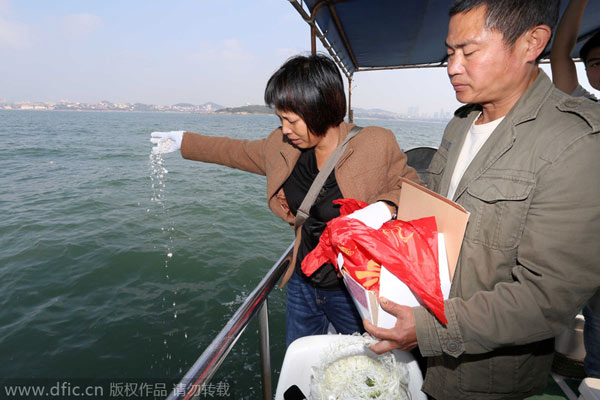Undertaker offers chance to 'rest in space'
By Song Wei (chinadaily.com.cn) Updated: 2015-02-04 15:38
 |
|
A couple scatter the ashes of their dead aughter in the sea off Qingdao, Shandong province, Oct 11, 2014. [Photo/IC] |
Beijing began promoting sea burials in 1994. Wang Dedong, director of the Beijing Funeral Service Center, said the number of families opting for the service is expected to double to 2,400 compared with 2013.
"Previously, only a few young people or those in financial difficulties would choose sea burials, but the situation is changing. Now officials, well-educated people and those from other backgrounds are comfortable with it," he said.
The practice accounts for about 2 percent of the annual funerary services sector but he said, "future prospects are very promising".
The Beijing Funeral Service Center, considered the only service provider in the capital authorized to perform sea burials, waives all service fees for Beijing residents but charges 380 yuan ($61) for those without a Beijing hukou, or permanent residency permit.
"The service is not available for foreigners yet," he said.
The city government is also considering building a vessel large enough to carry 500 people and provide more ash scattering tours during the spring and autumn seasons to meet the rising demand, he said.
The scattering of ashes at sea is also becoming more popular in other Chinese cities. In Shanghai, more than 28,000 residents have been buried at sea since the government began promoting it in 1991. According to official statistics, the service has helped to save 8.3 hectares of land.
Local media reported last month that 122 families from Harbin, Heilongjiang province, opted for the service, five times more than in 2013.
Wang Guohua, deputy director of the committee of experts at the China Funeral Association, said a sea burial is an ecologically friendly and economically sound choice in the coastal regions.
"As a populous country, there will be less and less space for the living if we continue the traditional practice of land burials," he said.
"Sea burials help to save considerable land resources."
Xiao Chenglong, director of the Environmental Monitoring Center Station under the Ministry of Civil Affairs, said sea burials can be a more environmentally friendly choice, but also said service providers should avoid contaminating marine industries such as fishing and seaweed farming along the coastal areas.
- Govt encourages people to work 4.5 days a week
- Action to be taken as HIV cases among students rise
- Debate grows over reproductive rights
- Country's first bishop ordained in 3 years
- China builds Tibetan Buddhism academy in Chengdu
- Authorities require reporting of HIV infections at schools
- Typhoon Soudelor kills 14 in East China
- Police crack down on overseas gambling site
- Debate over death penalty for child traffickers goes on
- Beijing to tighten mail security for war anniversary







